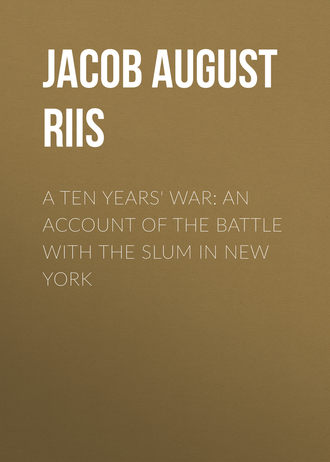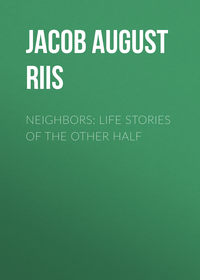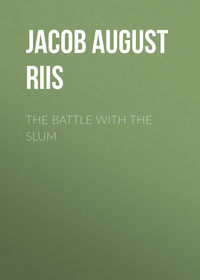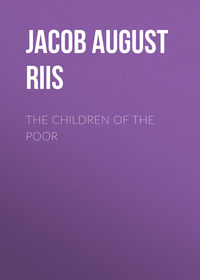 полная версия
полная версияA Ten Years' War: An Account of the Battle with the Slum in New York
"The people of the State of New York, represented in Senate and Assembly, do enact as follows:—
"Section 1. Hereafter no schoolhouse shall be constructed in the city of New York without an open-air playground attached to or used in connection with the same.
"Section 2. This act shall take effect immediately."
Where the map was daubed with red the school pins crowded one another. On the lower East Side, where child crime was growing fast, and no less than three storm centres were marked down by the police, nine new schools were going up or planned, and in the uptown precinct whence came the wail about the ball players there were seven. The playground had proved its case. Where it was expedient it was to be a school playground. It seemed a happy combination, for the new law had been a stumbling-block to the school commissioners, who were in a quandary over the needful size of an "open-air playground." The success of the roof-garden idea suggested a way out. But schools are closed at the time of the year when playgrounds are most needed for city children. To get the garden on the roof of the schoolhouse recognized as the public playground seemed a long step toward turning it into a general neighborhood evening resort that should be always open, and so toward bringing school and people, and especially the school and the boy, together in a bond of mutual sympathy highly desirable for both.
That was the burden of the committee's report. It made thirteen recommendations besides, as to the location of parks and detached playgrounds, only one of which has been adopted. But that is of less account—as also was the information imparted to me as secretary of the committee by our peppery Tammany mayor, that we had "as much authority as a committee of bootblacks in his office"—than the fact that the field has at last been studied and its needs have been made known. The rest will follow, with or without the politician's authority. The one recommendation that has been carried out was that of a riverside park in the region uptown on the West Side where the Federation of Churches and Christian Workers found "saloon social ideals minting themselves upon the minds of the people at the rate of seven saloon thoughts to one educational thought." There is an outdoor gymnasium to-day on the chosen site,—while the legal proceedings to take possession are unraveling their red tape,—and a recreation pier hard by. In the evening the young men of the neighborhood may be seen trooping riverward with their girls to hear the music. The gang that "laid out" two policemen, to my knowledge, has gone out of business.
The best laid plans are sometimes upset by surprising snags. We had planned for two municipal playgrounds on the East Side where the need is greatest, and our plans were eagerly accepted by the city authorities. But they were never put into practice. A negligent attorney killed one, a lazy clerk the other. And both served under the reform government. The first of the two playgrounds was to have been in Rivington Street, adjoining the new public bath, where the boys, for want of something better to do, were fighting daily battles with stones, to the great damage of windows and the worse aggravation of the householders. Four hundred children in that neighborhood petitioned the committee for a place of their own where there were no windows to break, and we found one. It was only after the proceedings had been started that we discovered that they had been taken under the wrong law and the money spent in advertising had been wasted. It was then too late. The daily assaults upon the windows were resumed. The other case was an attempt to establish a model school park in a block where more than four thousand children attended day and night school. The public school and the pro-cathedral, which divided the children between them, were to be allowed to stand, at opposite ends of the block. The surrounding tenements were to be torn down to make room for a park and playground which should embody the ideal of what such a place ought to be, in the opinion of the committee. The roof garden was not in the original plan except as an alternative of the street-level playground, where land came too high. The plentiful supply of light and air, the safety from fire to be obtained by putting the school in a park, beside the fact that it could thus be "built beautiful," were considerations of weight. Plans were made, and there was great rejoicing in Essex Street, until it came out that this scheme had gone the way of the other. The clerk who should have filed the plans in the register's office left that duty to some one else, and it took just twenty-one days to make the journey, a distance of five hundred feet or less. The Greater New York had come then with Tammany, and the thing was not heard of again. When I traced the failure down to the clerk in question, and told him that he had killed the park, he yawned and said:—
"Yes, and I think it is just as well it is dead. We haven't any money for those things. It is very nice to have small parks, and very nice to have a horse and wagon, if you can afford it. But we can't. Why, there isn't money enough to run the city government."
So the labor of weary weeks and months in the children's behalf was all undone by a third-rate clerk in an executive office; but he saved the one thing he had in mind: the city government is "run" to date, and his pay is secure.
Neither stupidity, spite, nor the false cry that "reform extravagance" has wrecked the city's treasury will be able much longer, however, to cheat the child out of his rights. The playground is here to wrestle with the gang for the boy, and it will win. It came so quietly that we hardly knew of it till we heard the shouts. It took us seven years to make up our minds to build a play pier,—recreation pier is its municipal title,—and it took just about seven weeks to build it when we got so far; but then we learned more in one day than we had dreamed of in the seven years. Half the East Side swarmed over it with shrieks of delight, and carried the mayor and the city government, who had come to see the show, fairly off their feet. And now "we are seven," or will be when the one in Brooklyn has been built,—great, handsome structures, seven hundred feet long, some of them, with music every night for mother and the babies, and for papa, who can smoke his pipe there in peace. The moon shines upon the quiet river, and the steamers go by with their lights. The street is far away with its noise. The young people go sparking in all honor, as it is their right to do. The councilman who spoke the other day of "pernicious influences" lying in wait for them there made the mistake of his life, unless he has made up his mind to go out of politics. The play piers have taken a hold of the people which no crabbed old bachelor can loosen with trumped-up charges. Their civilizing influence upon the children is already felt in a reported demand for more soap in the neighborhood where they are, and even the grocer smiles approval.
The play pier is the kindergarten in the educational campaign against the gang. It gives the little ones a chance. Often enough it is a chance for life. The street as a playground is a heavy contributor to the undertaker's bank account. I kept the police slips of a single day in May two years ago, when four little ones were killed and three crushed under the wheels of trucks in tenement streets. That was unusual, but no day has passed in my recollection that has not had its record of accidents which bring grief as deep and lasting to the humblest home as if it were the pet of some mansion on Fifth Avenue that was slain. The kindergarten teaching bore fruit. To-day there are half a dozen full-blown playgrounds downtown and uptown where the children swarm. Private initiative set the pace, but the idea has been engrafted upon the municipal plan. The city helped get at least one of them under way. The Outdoor Recreation League was organized last year by public-spirited citizens, including many amateur athletes and enthusiastic women, with the object of "obtaining recognition of the necessity for recreation and physical exercise as fundamental to the moral and physical welfare of the people." Together with the Social Reform Club and the Federation of Churches and Christian Workers it maintained a playground on the uptown West Side last summer. The ball came into play there for the first time as a recognized factor in civic progress. The day might well be kept for all time among those that mark human emancipation, for it was social reform and Christian work in one, of the kind that tells.
Only the year before, the athletic clubs had vainly craved the privilege of establishing a gymnasium in the East River Park, where the children wistfully eyed the sacred grass, and cowered under the withering gaze of the policeman. A friend whose house stands opposite the park found them one day swarming over her stoop in such shoals that she could not enter, and asked them why they did not play tag under the trees instead. The instant shout came back: "'Cause the cop won't let us." Now a splendid gymnasium has been opened on the site of the people's park that is to come at Fifty-Third Street and Eleventh Avenue. It is called Hudsonbank. A board fence more than a thousand feet long surrounds it. The director pointed out to me with pride, last week, that not a board had been stolen from it in a year, while other fences within twenty feet of it were ripped to pieces. And he was right. The neighborhood is one that has been anything but distinguished for its respect for private property in the past, and where boards have a market value among the Irish settlers. Better testimony could not have been borne to the spirit in which the gift was accepted by the children.
Poverty Gap, that was fairly transformed by one brief season's experience with its "Holy Terror Park,"5 a dreary sand lot upon the site of the old tenements in which the Alley Gang once murdered the one good boy of the block for the offense of supporting his aged parents by his work as a baker's apprentice,—Poverty Gap is to have its permanent playground, and Mulberry Bend and Corlears Hook are down on the League's books; which is equivalent to saying that they, too, will shortly know the climbing pole and the vaulting buck. For years the city's only playground that had any claim upon the name—and that was only a little asphalted strip behind a public school in First Street—was an old graveyard. We struggled vainly to get possession of another, long abandoned. The dead were of more account than the living. But now at last it is their turn. The other day I watched the children at their play in the new Hester Street gymnasium. The dusty square was jammed with a mighty multitude. It was not an ideal spot, for it had not rained in weeks, and powdered sand and cinders had taken wing and floated like a pall over the perspiring crowd. But it was heaven to them. A hundred men and boys stood in line, waiting their turn upon the bridge ladder and the traveling rings that hung full of struggling and squirming humanity, groping madly for the next grip. No failure, no rebuff discouraged them. Seven boys and girls rode with looks of deep concern—it is their way—upon each end of the see-saw, and two squeezed into each of the forty swings that had room for one, while a hundred counted time and saw that none had too much. It is an article of faith with these children that nothing that is "going" for their benefit is to be missed. Sometimes the result provokes a smile, as when a band of young Jews, starting up a club, called themselves the Christian Heroes. It was meant partly as a compliment, I suppose, to the ladies that gave them club-room; but at the same time, if there was anything in a name, they were bound to have it. It is rather to cry over than to laugh at, if one but understands it. The sight of these little ones swarming over a sand heap until scarcely an inch of it was in sight, and gazing in rapt admiration at the poor show of a dozen geraniums and English ivy plants in pots on the window-sill of the overseer's cottage, was pathetic in the extreme. They stood for ten minutes at a time resting their eyes upon them. In the crowd were aged women and bearded men with the inevitable Sabbath silk hat, who it seemed could never get enough of it. They moved slowly, when crowded out, looking back many times at the enchanted spot, as long as it was in sight.
Perhaps there was in it, on the part of the children at least, just a little bit of the comforting sense of proprietorship. They had contributed of their scant pennies more than a hundred dollars toward the opening of the playground, and they felt that it was their very own. All the better. Two policemen watched the passing show, grinning. But their clubs hung idly from their belts. The words of a little woman whom I met last year in Chicago kept echoing in my ear. She was the "happiest woman alive," for she had striven long for a playground for her poor children, and had got it.
"The police like it," she said. "They say that it will do more good than all the Sunday schools in Chicago. The mothers say, 'This is good business.' The carpenters that put up the swings and things worked with a will; everybody was glad. The police lieutenant has had a tree called after him. The boys that did that used to be terrors. Now they take care of the trees. They plead for a low limb that is in the way, that no one may cut it off."
The twilight deepens and the gates of the playground are closed. The crowds disperse slowly. In the roof garden on the Hebrew Institute across East Broadway lights are twinkling and the band is tuning up. Little groups are settling down to a quiet game of checkers or love-making. Paterfamilias leans back against the parapet where palms wave luxuriously in the summer breeze. The newspaper drops from his hand; he closes his eyes and is in dreamland, where strikes come not. Mother knits contentedly in her seat, with a smile on her face that was not born of the Ludlow Street tenement. Over yonder a knot of black-browed men talk with serious mien. They might be met any night in the anarchist café, half a dozen doors away, holding forth against empires. Here wealth does not excite their wrath, nor power their plotting. In the roof garden anarchy is harmless, even though a policeman typifies its government. They laugh pleasantly to one another as he passes, and he gives them a match to light their cigars. It is Thursday, and smoking is permitted. On Friday it is discouraged because it offends the orthodox, to whom the lighting of a fire, even the holding of a candle, is anathema on the Sabbath eve.
The band plays on. One after another, tired heads droop upon babes slumbering peacefully at the breast. Ludlow Street, the tenement, are forgotten; eleven o'clock is not yet. Down along the silver gleam of the river a mighty city slumbers. The great bridge has hung out its string of shining pearls from shore to shore. "Sweet land of liberty!" Overhead the dark sky, the stars that twinkled their message to the shepherds on Judæan hills, that lighted their sons through ages of slavery, and the flag of freedom borne upon the breeze,—down there the tenement, the—Ah, well! let us forget, as do these.
Now if you ask me: "And what of it all? What does it avail?" let me take you once more back to the Mulberry Bend, and to the policeman's verdict add the police reporter's story of what has taken place there. In fifteen years I never knew a week to pass without a murder there, rarely a Sunday. It was the wickedest, as it was the foulest, spot in all the city. In the slum the two are interchangeable terms for reasons that are clear enough to me. But I shall not speculate about it, only state the facts. The old houses fairly reeked with outrage and violence. When they were torn down, I counted seventeen deeds of blood in that place which I myself remembered, and those I had forgotten probably numbered seven times seventeen. The district attorney connected more than a score of murders of his own recollection with Bottle Alley, the Whyó gang's headquarters. Two years have passed since it was made into a park, and scarce a knife has been drawn, or a shot fired, in all that neighborhood. Only twice have I been called as a police reporter to the spot. It is not that the murder has moved to another neighborhood, for there has been no increase of violence in Little Italy or wherever else the crowd went that moved out. It is that the light has come in and made crime hideous. It is being let in wherever the slum has bred murder and robbery, bred the gang, in the past. Wait, now, another ten years, and let us see what a story there will be to tell.
Avail? Why, here is Tammany actually applauding Comptroller Coler's words in Plymouth Church last night: "Whenever the city builds a schoolhouse upon the site of a dive and creates a park, a distinct and permanent mental, moral, and physical improvement has been made, and public opinion will sustain such a policy, even if a dive-keeper is driven out of business and somebody's ground rent is reduced." And Tammany's press agent sends forth this pæan: "In the light of such events how absurd it is for the enemies of the organization to contend that Tammany is not the greatest moral force in the community." Tammany a moral force! The park and the playground have availed, then, to bring back the day of miracles.
VII
JUSTICE FOR THE BOY
Sometimes, when I see my little boy hugging himself with delight at the near prospect of the kindergarten, I go back in memory forty years and more to the day when I was dragged, a howling captive, to school, as a punishment for being bad at home. I remember, as though it were yesterday, my progress up the street in the vengeful grasp of an exasperated servant, and my reception by the aged monster—most fitly named Madame Bruin—who kept the school. She asked no questions, but led me straightway to the cellar, where she plunged me into an empty barrel and put the lid on over me. Applying her horn goggles to the bunghole, to my abject terror, she informed me, in a sepulchral voice, that that was the way bad boys were dealt with in school. When I ceased howling from sheer fright, she took me out and conducted me to the yard, where a big hog had a corner to itself. She bade me observe that one of its ears had been slit half its length. It was because the hog was lazy, and little boys who were that way minded were in danger of similar treatment; in token whereof she clipped a pair of tailor's shears suggestively close to my ear. It was my first lesson in school. I hated it from that hour.
The barrel and the hog were never part of the curriculum in any American boy's school, I suppose; they seem too freakish to be credited to any but the demoniac ingenuity of my home ogre. But they stood for a comprehension of the office of school and teacher which was not patented by any day or land. It is not so long since the notion yet prevailed that the schools were principally to lock children up in for the convenience of their parents, that we should have entirely forgotten it. Only the other day a clergyman from up the State came into my office to tell of a fine reform school they had in his town. They were very proud of it.
"And how about the schools for the good boys in your town?" I asked, when I had heard him out. "Are they anything to be proud of?"
He stared. He guessed they were all right, he said, after some hesitation. But it was clear that he did not know.
It is not necessary to go back forty years to find us in the metropolis upon the clergyman's platform, if not upon Madame Bruin's. Ten will do. They will bring us to the day when roof playgrounds were contemptuously left out of the estimates for an East Side school, as "frills" that had nothing to do with education; when the Board of Health found but a single public school in more than sixscore that was so ventilated as to keep the children from being poisoned by foul air; when the authority of the Talmud had to be invoked by the Superintendent of School Buildings to convince the president of the Board of Education, who happened to be a Jew, that seventy-five or eighty pupils were far too many for one class-room; when a man who had been dead a year was appointed a school trustee of the Third Ward, under the mouldy old law surviving from the day when New York was a big village, and filled the office as well as if he had been alive, because there were no schools in his ward; when manual training and the kindergarten were yet the fads of yesterday, looked at askance; when fifty thousand children roamed the streets for whom there was no room in the schools, and the only defense of the School Commissioners was that they "didn't know" there were so many; and when we mixed truants and thieves in a jail with entire unconcern. Indeed, the jail filled the title rôle in the educational cast of that day. Its inmates were well lodged and cared for, while the sanitary authorities twice condemned the Essex Market school across the way as wholly unfit for children to be in, but failed to catch the ear of the politician who ran things unhindered. When (in 1894) I denounced the "system" of enforcing—or not enforcing—the compulsory education law as a device to make thieves out of our children by turning over their training to the street, he protested angrily; but the experts of the Tenement House Committee found the charge fully borne out by the facts. They were certainly plain enough in the sight of us all, had we chosen to see.
When at last we saw, we gave the politician a vacation for a season. To say that he was to blame for all the mischief would not be fair. We were to blame for leaving him in possession. He was only a link in the chain which our indifference had forged; but he was always and everywhere an obstruction to betterment,—sometimes, illogically, in spite of himself. Successive Tammany mayors had taken a stand for the public schools, when it was clear that reform could not be delayed much longer; but they were helpless against a system of selfishness and stupidity of which they were the creatures, though they posed as its masters. They had to go with it as unfit, and upon the wave that swept out the last of the rubbish came reform. The Committee of Seventy took hold, the Good Government Clubs, the Tenement House Committee, and the women of New York. Five years we strove with the powers of darkness, and look now at the change. The New York school system is not yet the ideal one,—it may never be; but the jail, at least, has been cast out of the firm. We have a compulsory education law under which it will be possible, when a seat has been provided for every child, to punish the parent for the boy's truancy, unless he surrenders him as unmanageable; and we can count the months now till every child shall find the latchstring out on the school door. We have had to put our hands deep into our pockets to get to that point, but we are nearly there now. Since 1895 the expenditure of twenty-two and a half millions of dollars for new schools in the old city has been authorized by law, and two thirds of the money has been spent. Fifty-odd new buildings have been put up, or are going up while I am writing, every one of them with its playground, which will by and by be free to all the neighborhood. The idea is at last working through that the schools belong to the people, and are primarily for the children and their parents; not mere vehicles of ward patronage, or for keeping an army of teachers in office and pay.
The silly old régime is dead. The ward trustee is gone with his friend the alderman, loudly proclaiming the collapse of our liberties in the day that saw the schools taken from "the people's" control. They were "the people." Experts manage our children's education, which was supposed in the old plan to be the only thing that did not require any training. To superintend a brickyard demanded some knowledge, but anybody could run the public schools. It cost us an election to take that step. One of the Tammany district leaders, who knew what he was talking about, said to me after it was all over: "I knew we would win. Your bringing those foreigners here did the business. Our people believe in home rule. We kept account of the teachers you brought from out of town, and who spent the money they made here out of town, and it got to be the talk among the tenement people in my ward that their daughters would have no more show to get to be teachers. That did the business. We figured the school vote in the city at forty-two thousand, and I knew we could not lose." The "foreigners" were teachers from Massachusetts and other States, who had achieved a national reputation at their work.









